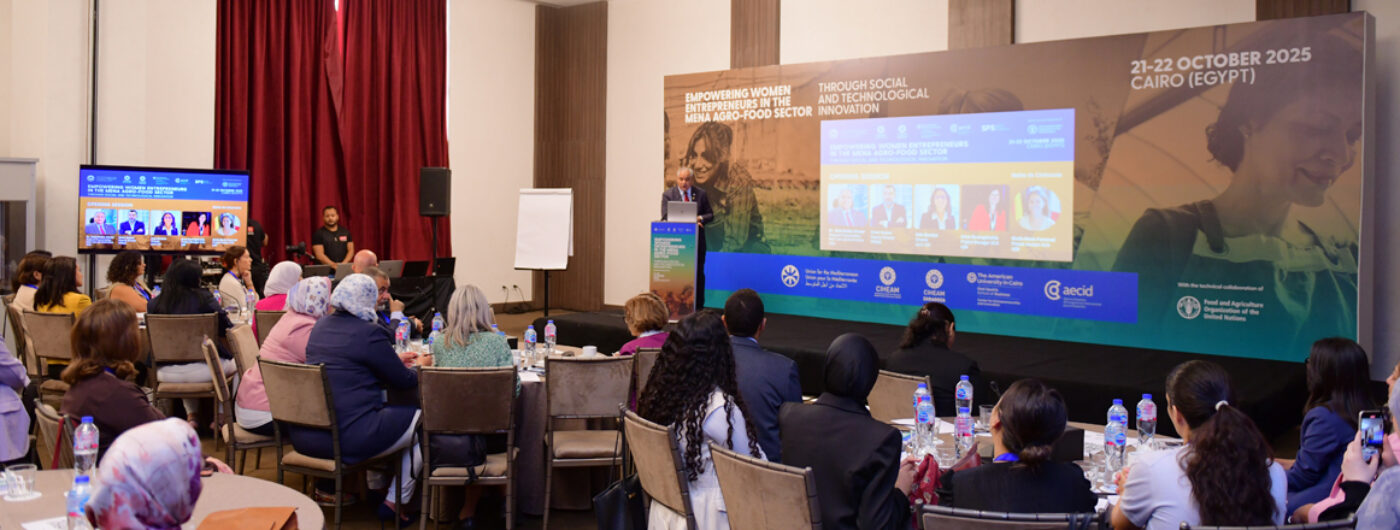
Empowering women entrepreneurs in the MENA agro-food sector through social and technological innovation
21–22 October 2025, Cairo. Around 80 regional stakeholders – including women entrepreneurs, innovation hubs, representatives of women-led cooperatives, research institutions, national institutions, donors, investment funds and financial institutions and international organisations – gathered in Cairo for the Regional Stakeholder Dialogue and Training on Empowering Women Entrepreneurs in the MENA Agro-Food Sector through Social and Technological Innovation.
The event, organised by the Union for the Mediterranean (UfM) with the financial support of AECID, and in collaboration with CIHEAM, the FAO Near East and North Africa Regional Office, the American University in Cairo (AUC) Center for Entrepreneurship and Innovation (CEI), and the SFS Platform showcased regional efforts to advance women’s leadership and innovation in agro-food systems.
Women across the MENA region play a vital role in food systems – as producers, processors, retailers, and innovators – yet continue to face persistent barriers such as limited access to land, finance, and innovation ecosystems. The Dialogue highlighted the urgent need to harness women-led innovation to drive resilient, inclusive, and sustainable agro-food systems in the face of climate, economic, and food security challenges.
The two-day event combined a 1.5-day capacity-building training for 50 women entrepreneurs and cooperative leaders from seven UfM-Masar countries (Algeria, Egypt, Jordan, Lebanon, Morocco, Palestine, and Tunisia) with a regional stakeholder dialogue that gathered donors, UN agencies, and regional partners. Participants contributed to co-identify policy priorities and mechanisms to accelerate women’s entrepreneurship and innovation in agro-food value chains.
Opening remarks by Abdulhakim Elwaer (FAO RNE), Omar Amawi (PRIMA), Hala Barakat (AUC CEI), Raul Compez (CIHEAM) and Anna Dorangricchia (UfM) highlighted the critical role of women entrepreneurs as catalysts for inclusive and climate-resilient agro-food systems. Speakers underlined persistent barriers to women’s participation – such as limited access to finance, technology, and decision-making – and reaffirmed their shared commitment to address these through coordinated regional action. Ms Dorangricchia outlined the main activities focused on women in afro-food to be implemented with the financial support of AECID in 2026, which will be the International year of women farmers.
In this context, a Joint Draft Declaration “CIHEAM-UfM Commitment to a Regional Agenda on Innovation for Women Entrepreneurs in the Agro-Food Value Chain in the Euro-Mediterranean Region” – was presented. The document outlines a shared vision and commitment to strengthen women’s access to enabling ecosystems, enhance their participation in decision-making processes, and promote gender-sensitive policies and technologies.
Discussions centred on four thematic pillars: inclusive innovation ecosystems, access to finance and infrastructure, enabling policies and institutions, and leadership and collective action. Participants exchanged good practices and recommendations to feed into the forthcoming Regional Innovation Agenda for Women Entrepreneurs in Agro-Food Value Chains.
The UfM will coordinate the drafting of a Regional Innovation Agenda for Women Entrepreneurs in Agro-Food Value Chains, integrating the recommendations shared by the participants and partners during the event. Participants were also invited to join the upcoming Empowering Businesswomen in the WEFE Nexus workshop, to be held in December online (Register at the following link: https://form.jotform.com/252912826296364)


